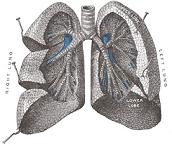|
From rxpgnews.com Lung
BRaf is one of three members of the RAF kinase family, which, upon activation, induces the mitogen-activated protein/extracellular signal-regulated kinase kinase (MEK) cell signaling pathway and promotes cell proliferation. Activating mutations in BRaf (ie., a mutation that causes the activation of the catalytic activity of the BRaf protein) are implicated in a number of different human cancers, including the majority of melanoma cancers, as well as in colorectal, thyroid, ovarian and non-small cell lung cancers. Dr. McMahon and colleagues engineered a strain of mice to carry a version of the BRaf gene that the researchers could activate at will both temporally and spatially. After activating BRaf specifically in the lungs of mice at 6-8 weeks of age, the researchers observed that the BRaf-mutant mice (or BRaf(VE), as they are known) developed multiple lung tumors that were pathologically similar to human lung tumors thereby establishing BRaf as a bona fide oncoprotein. Administration of the MEK-inhibitor, PD0325901 (developed by Pfizer, and now in clinical trials) effectively halted tumor progression in BRaf(VE) mice. Interestingly, however, without pharmacological intervention, the BRaf-mutant tumors eventually stopped proliferating, and entered into a senescent state. This senescent state could be overcome by concomitant mutation of either p53 or p16(Ink4a)/p19(Arf), enabling tumors to become adenocarcinomas. Dr. McMahon said that the striking response of BRaf(VE)-induced lung tumors to MEK inhibition is most likely because the tumors are at such an early stage of their development. Such observations further emphasize the need for early detection in human lung cancer, since the earlier a tumor is detected the more likely it is to be curable. However, MEK inhibitors may still be useful for late stage cancers, especially if used in conjunction with conventional chemotherapy, a question that McMahon and colleagues are planning to address in their next round of experiments. All rights reserved by RxPG Medical Solutions Private Limited ( www.rxpgnews.com ) |
